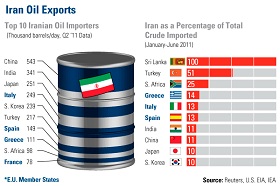Many observers quickly put the Geneva accords with Iran on a par with the Camp David agreements, which definitely seems like an overstatement, in the very least because the Geneva accords are temporary, aimed at lasting only six moths and at normalizing the atmosphere for a genuinely global package deal between Iran and the United States. If reached, Geneva is sure to surpass Camp David in scale and significance, as Washington would lift sanctions and recognize Tehran's right to a nuclear program. In return, Tehran would place the program under the strictest IAEA controls and considerably alter its behavior in the Middle East.
Certainly the most expected international agreement of 2014, the deal is far from sealed. International media commentators and analysts concur that obstacles are many, not to mention the actions of Saudi Arabia and Israel – two foes who have united to torpedo the U.S.-Iranian reset. However, much graver threats to the future accords emanate from the domestic politics of the negotiating states, i.e. from the U.S. and Iranian conservatives.
Palpable Pros and Ideological Contras
From a rational perspective, both countries badly need the agreements. With them in place, the United States could eventually stabilize the entire Great Middle East from Afghanistan to Levant; rectify some of the errors committed during the Arab Spring – from surrendering its ally Egyptian president Hosni Mubarak to involvement in Syria, and restore the regional balance of forces. As a result, the U.S.A. could rebalance its resources toward East Asia, its new strategic focus.
Hence, President Obama believes that a diplomatic settlement is "worth experimenting" with and the gambit has "a 50 percent chance of success." In its turn, Iran would have the most harmful economic sanctions lifted and all its Middle East achievements obtained during the past 10 years legitimized. Since major Arab states like Syria and Egypt are plagued by crisis and further trouble appears imminent for Saudi Arabia, the industrialized, rich and nuclear Iran could become the largest and most influential power in the Middle East, capable of making its own mark in the reach.
Although the agreements promise obvious gains, certain forces both in the U.S.A. and Iran oppose the deal, equating it with Munich rather than Camp David, since it would allegedly betray national interests.
On the one hand, the existence of an opposition stance is helpful. First, it should push Barack Obama and Hassan Rouhani toward the use of maximum flexibility and away from procrastinating during the talks. Second, the very fact of resistance from the utterly conservative and radical circles in both countries testifies to the agreement's revolutionary core. "When John Bolton, the most enthusiastic armchair warrior of the George W. Bush brigade, and Mohammad Reza Naqdi, the head of Iran’s brutal Basij paramilitary, are both unhappy, you’ve probably done something right," writes Bill Keller, former executive editor of the New York Times.
However, both American and Iranian radical oppositions are sufficiently powerful and have every opportunity and political capability of going all the way and undermining the deal. "Both see the West and Iran engaged in an existential struggle, immune to diplomacy," continues Bill Keller.
U.S. Congress for Israel
The U.S. conservatives are skeptical primarily because of their traditional enmity towards Iran, which is still not forgiven for the 30-year-old humiliation when American diplomats were taken hostage in Tehran. They see Iran as an absolute evil resurrecting on the international scene. "This central banker of international terrorism and flagrant nuclear proliferator is once again part of the international club," writes Mr. Bolton. American conservatives regard Iranian leaders as religious zealots unfit for any kind of agreements. "Did the negotiators ask the Iranians if they’ve consulted Allah about this deal? If Iranian leaders claim to be doing the will of god, why would they tell infidel Western diplomats Iran intends to disobey Allah and not build nuclear weapons to be used against a nation — Israel — that Allah seemingly wants obliterated?" asks Cal Thomas, a rightwing Fox News commentator. Accordingly, right wing experts permanently associate the Geneva agreements with the Munich deal (for example Middle East expert Daniel Pipes and leading conservative ideologist Charles Krauthammer).
Today, Iran skeptics are definitely in the minority. According to surveys, about 60 percent of the American electorate and 70 percent of the expert community support the Iran rapprochement. However, the point is that the case of Messrs. Bolton and Krauthammer is shared by a great deal of members of Congress. In early December, the White House polled Congress just to find out that only 17 out of 535 Representatives and Senators openly supported the Geneva agreements.
American pundits joke that the attitudes of the Capitol Hill go this way because the Israeli prime minister holds it tighter than the U.S. president. Having lost all hopes of talking Mr. Obama out of the Iran deal, Benjamin Netanyahu has mobilized the Israeli lobby in Congress to undermine the process, in particular through the adoption of more sanctions against Tehran.
Signing the Geneva accords, the United States has committed itself to refrain from new sanctions; therefore, Mr. Obama personally addressed Congress to put aside such an act at least for six months. Formally, Congress appears cooperative as the bill mentions delayed sanctions, which means that Capitol Hill will still approve the new restrictions, their implementation will be postponed, and they will come into force if the deal fails or Congress deems the terms unsatisfactory. At that, some in Congress insist that the adoption of such an act should even help Mr. Obama. “From my perspective, it strengthens the administration’s hand,” says Democratic Senator Robert Menendez. “It would make clear to the Iranians if they don’t strike a deal, this is what’s coming". However, it appears more likely that the move would frustrate the talks, since the Iranians are likely to reject a dialogue on such conditions, as clearly stated by Iranian Foreign Minister Mohammad Zarif.
However, Mr. Obama still might kill the new sanctions bill. While the Republican-dominated House of Representatives is hopeless, in the Senate much depends on the still hesitant Majority Leader Harry Reid, who is to put the bill to a vote. If the bill is passed, the president will have no choice but to veto it and become fully responsible for implementation of the agreement, which might affect the results of the November 2014 midterm elections if the deal collapses.
Sanctions Mean Business
Also potent, Iranian opposition to the deal can be divided into three groups. The first group includes mainstream radicals from the clerical and political circles. They have viewed the United States as the Great Satan for decades and are unwilling to renounce their views. The second group consists of pragmatics related to the national oil sector. "The Iranian National Oil Company just would not like to have foreign competitors. Although the national energy market is in grave crisis due to a lack of technologies and investments in the new fields, it still brings in a profit," explains well-known Iranian political scientist Sevak Sarukhanyan. The Iranian petroleum bureaucracy is seriously worried about the possible revival of the buy back practice that existed under Mohammad Khatami and envisaged foreign investments in return for a production share. The third group is made of those controlling or operating gray exports, first of all the top brass of the Islamic Revolution Guards Corps. Mr. Sarukhanyan continues: "As far as oil is concerned, nobody knows how much of it Iran exports. Apart from official volumes within contracts with the Chinese, Indians and other authorized buyers, for over two years oil has also been sold by private oil exporters, as practically any company may buy a quantity from the state and deliver it anywhere. As a result, Iranian oil may be found in Singapore, South Korea and some other countries.”
The foes of the agreement are very powerful, so its future will actually hinge on the Rahbar, i.e. Iranian spiritual leader Ali Khamenei. Iran skeptics in the U.S.A. insist that he is definitively against the deal, at least because, as Karim Sadjadpour of the Carnegie Endowment puts it, many of his supporters are “people who have been attending Friday prayers for the last three decades crying ‘Death to America.’” But the reality is somewhat more complicated. First, Mr. Khamenei realizes that Iranian society is exhausted by sanctions that have ruined the national economy and triggered a price hike – there was even a situation when the interior minister requested national TV-series producers to leave out scenes in which actors eat meat. Craving for political and economic change, the people elected President Hassan Rouhani who criticized his predecessor Mahmud Ahmadinejad, not for the nuclear program proper, but for excessive aggressiveness that has united all Iran opponents and caused sanctions. And the Rahbar understands that if the craving is not satisfied, it is his, rather than the president's head that would be at stake.
Today Mr. Khamenei has assumed a position he deems optimal, i.e. benevolent neutrality combined with the business-as-usual criticism of the United States. He has allowed President Rouhani to go ahead with the talks, reserving the right to kill the final package deal if he finds it inappropriate. But even in this case, he is unlikely to stop negotiating with the U.S.A. and should play the game of good president – bad Rahbar, presenting Mr. Rouhani as the good guy and himself as a conservative leader hampering an agreement with the Americans. If this approach fails to get the sanctions lifted, it should at least minimize the risk of an attack against Iran. "No bombs may fall on the country whose president is honored with a phone conversation with President Obama and foreign minister is smiled at by John Kerry. It is much simpler to bomb the country calling for annihilation of Israel," believes Mr. Sarukhanyan.
For the time being, both Iranian and American opponents of the deal have failed to develop an effective mechanism for its disruption, although the situation could change at any moment. The level of bilateral trust is abysmally low, and a single provocation could set off an avalanche and bury every hope for an accord. Iranian leaders have virtually become hostage to the state-led policy of demonizing America. An Israeli airstrike against Iranian nuclear facilities would in no time deprive Mr. Rouhani of the Rahbar's protection and the support of the population, which is unlikely to be convinced that the Israelis attacked Iran in the absence of U.S. consent.
In his turn, Mr. Obama should do his best to persuade lawmakers to amend their approach to American-Iranian relations. Mr. Khamenei is not likely to make concessions and approve the deal without guarantees for its subsequent ratification by Congress. In other words, both sides are in for hard, painstaking and intricate work aimed both at approving and effectively promoting the agreement at home. However, if successful, their efforts should be definitely worth the Nobel Peace Prize, since the Iran-U.S.A. package deal appears to be the only chance for stabilizing the region.







